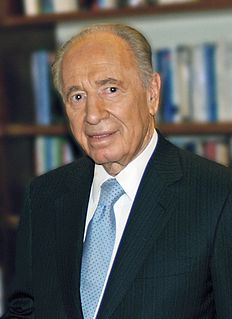
The Prime Minister of Israel is the head of government and chief executive of Israel.

Shas is an ultra-Orthodox religious political party in Israel. Founded in 1984 under the leadership of Rabbi Ovadia Yosef, a former Israeli Sephardi chief rabbi, who remained its spiritual leader until his death in October 2013, it primarily represents the interests of Haredi Sephardic and Mizrahi Jews. The party works to end prejudice and discrimination against the Sephardic community, and highlights economic issues and social justice.
Tzomet is a small secular, right-wing political party in Israel.
Tehiya, originally known as Banai, then Tehiya-Bnai, was an ultranationalist political party in Israel. The party existed from 1979 until 1992. In the eyes of many, Tehiya was identified with Geula Cohen, who founded the party and headed it throughout its existence.
Gahal was the major right-wing political alliance in Israel led by Menachem Begin from its founding in 1965 until the establishment of Likud in 1973.
Elections for the 16th Knesset were held in Israel on 28 January 2003. The result was a resounding victory for Ariel Sharon's Likud.
The Democratic Movement for Change, commonly known by its Hebrew acronym Dash was a short-lived and initially highly successful centrist political party in Israel. Formed in 1976 by numerous well-known non-politicians, following a spectacular breakup, it had ceased to exist within less than two years.
The Independent Liberals were a political party in Israel between the 1960s and 1980s.
Elections for the seventh Knesset were held in Israel on 28 October 1969. Voter turnout was 81.7%.
Legislative elections were held in Israel on 17 May 1977 to elect the ninth Knesset. For the first time in Israeli political history, the right-wing, led by Likud, won a plurality of seats, ending almost 30 years of rule by the left-wing Alignment and its predecessor, Mapai. The dramatic shift in Israeli politics caused by the outcome led to it becoming known as "the revolution", a phrase coined by TV anchor Haim Yavin when he announced the election results live on television with the words "Ladies and gentlemen—a revolution!". The election saw the beginning of a period lasting almost two decades where the left- and right-wing blocs held roughly equal numbers of seats in the Knesset.
Telem was a political party in Israel.
Tami was a Mizrahi-dominated political party in Israel during the 1980s. It was led by Aharon Abuhatzira for its entire existence.
Elections for the eleventh Knesset were held in Israel on 23 July 1984. Voter turnout was 78.8%. The results saw the Alignment return to being the largest party in the Knesset, a status it had lost in 1977. However, the party could not form a government with any of the smaller parties, resulting in a national unity government with Likud, with both party leaders, Shimon Peres and Yitzhak Shamir, holding the post of Prime Minister for two years each.
Elections for the 12th Knesset were held in Israel on 1 November 1988. Voter turnout was 79.7%.

The eighteenth government of Israel was formed by Menachem Begin on 20 June 1977, following the May 1977 elections. It was the first government in Israeli political history led by a right-wing party, with the coalition consisting of Begin's Likud, the National Religious Party and Agudat Yisrael. Begin's government also contained Moshe Dayan who had been elected to the Knesset on the Alignment's list. Following Dayan's acceptance of a place in the cabinet, he was expelled from the party and sat as an independent MK, though he only remained in the cabinet for four months.
The dirty trick refers to a political scandal that erupted in Israel in 1990. It referred to an attempt by Shimon Peres to form a minority government made up of the left-wing factions and the ultra-orthodox parties. It failed when the ultra-orthodox parties backed out on the deal.

The twenty-third government of Israel was formed by Yitzhak Shamir of Likud on 22 December 1988, following the November 1988 elections. The government remained a national unity coalition between Likud and the Alignment, with the National Religious Party, Shas, Agudat Yisrael and Degel HaTorah also being members of the coalition. It was the first government to have a Minister of the Environment.
Ashkenazi Jews in Israel refers to immigrants and descendants of Ashkenazi Jews, who now reside within the state of Israel, in the modern sense also referring to Israeli Jewish adherents of the Ashkenazi Jewish tradition. They number 2.8 million and constitute one of the largest Jewish ethnic divisions in Israel, in line with Mizrahi Jews and Sephardi Jews.








